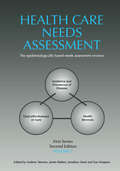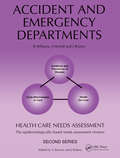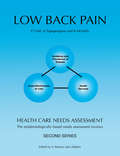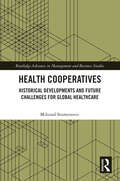- Table View
- List View
Health Care Needs Assessment, First Series, Volume 2, Second Edition: The Epidemiologically Based Needs Assessment Reviews, V. 2, First Series
by Jonathan Mant Andrew Stevens James Raftery Sue SimpsonHealth care needs assessment provides information to plan, negotiate and change services for the better, and to improve health in other ways. The first edition of this series established itself as a key source on health care needs for specific conditions supported by the Department of Health. Now in its second edition it provides vital updates taking into account how health care has moved on and how the structure of the UK's health service has changed. Each of the chapters follows the same structure; each analysing its topic, reviewing the incidence and prevalence, the range of services available, and the effectiveness of those services. It describes the central role and aim of health care needs assessment in the NHS health care reforms and explains the 'epidemiological approach' to needs assessment and its effectiveness. Volume 1 includes diabetes mellitus, renal disease, stroke, lower respiratory disease, coronary heart disease, colorectal cancer, cancer of the lung, osteoarthritis affecting the hip and knee, cataract surgery and groin hernia. Volume 2 includes varicose veins and venous ulcers, benign prostatic hyperplasia, severe mental illness, Alzheimer's disease, alcohol misuse, drug misuse, learning disabilities, community child health services and contraception, induced abortion and fertility services. All health professionals, including policy makers and shapers and those assessing quality of service will find this book an essential resource.
Health Care Needs Assessment: The Epidemiologically Based Needs Assessment Review
by Andrew Stevens James RafertyIn the past 10 years spirituality and spiritual care have been much debated in professional healthcare literature, highlighting the need for a recognised definition of spiritual care to enable appropriate assessment of, and response to, spiritual issues. This accessible and highly relevant book surveys the numerous statements, guidelines and standards highlighted by these discussions, and equips healthcare professionals with the knowledge, skills and competence to provide the essence of spiritual care within their professional practice. Practical and evidence-based, this manual proves that delivery of good, professional spiritual care can build on intuitive human skills, and can be taught, learned, assessed and quantified. It gives readers the opportunity to move on from uncertainties about their role in the delivery of spiritual care by allowing them to asses and improve their understanding, skills and clinical practice in this area of care. Spiritual Care for Healthcare Professionals clearly grounds spiritual care in clinical practice. It is highly recommended for supporting academic study and encouraging healthcare practitioners to reflect on their practice and develop skills in spiritual assessment and care. Aimed at all healthcare professionals, it can be used by individual practitioners for continuing professional development as well as by academic staff developing educational programmes.
Health Care Needs Assessment: The Epidemiologically Based Needs Assessment Reviews
by Andrew Stevens P.R. CroftThis volume, focusing on low back pain, is part of a survey of health care needs for specific conditions, published on behalf of the Department of Health. This study overall considers questions such as the population's needs, the services available or unavailable to them, the effectiveness of these services, and other perspectives in disease and service areas. This is the second series of needs assessment reviews.
Health Care Policy and Value-Based Competition: Implications for Government
by Michael E. Porter Elizabeth Olmsted TeisbergGovernment has a major influence on the health care system in the U.S. State and federal policy makers set numerous rules and regulations that affect the nature of competition in health care, as well as incentives and constraints for system participants. Health care policy has been both a reflection of and a contributor to the zero-sum competition that plagues the current system. According to the authors, the fundamental flaw in U.S. health care policy is its lack of focus on patient value and absence of an overall framework to guide reforms. In this chapter, Porter and Teisberg sketch out a framework for health care reform that is centered on value for patients.
Health Care Reform Act: Critical Tax and Insurance Ramifications
by Janemarie MulveyHealth Care Reform Act: Critical Tax and Insurance Ramifications by Janemarie Mulvey, Ph.D.
Health Care Research and Organization Theory (Elements in Organization Theory)
by Trish Reay Elizabeth Goodrick Thomas D'AunnoIn this Element, we examine how organizational researchers have published articles contributing to organization theory in high quality organizational journals, and we examine how healthcare researchers have drawn on organization theory in healthcare management journals. We have two main aims in writing this Element. The first is to motivate scholars working in the field of general organizational and management studies to increasingly use healthcare settings as an empirical context for their work in theory development. Our second aim is to encourage healthcare researchers to increase their use of organizational theory to advance knowledge about the provision of healthcare services. Our investigations revealed a growing number of organizational studies situated in healthcare. We also found a disappointing level of connection between research published in organization journals and research published in healthcare journals. We provide explanations for this division, and encourage more crossdisciplinary work in the future.
Health Care Systems Engineering: HCSE, Montréal, Canada, May 30 - June 1, 2019 (Springer Proceedings in Mathematics & Statistics #316)
by Ettore Lanzarone Valérie Bélanger Nadia Lahrichi Semih YalçındağThis book presents the proceedings of the Fourth International Conference on Health Care Systems Engineering (HCSE 2019), which took place in Montreal, Canada, from May 30 to June 1, 2019. The event took place in the mother and child university hospital CHU Sainte-Justine in Montréal, and each session was co-chaired by a discussant coming from the clinical practice.The conference offered scientists and practitioners an opportunity to discuss operations management issues in health care delivery systems, and to share new ideas, methods and technologies for improving the operation of health care organizations.Focusing on applications of systems engineering, optimization and statistics to improve health care delivery and health systems, the book covers topics relating to a broad spectrum of concrete problems that pose challenges for researchers and practitioners alike, including hospital drug logistics, operating theatre management, blood donation, home care services, modeling, simulation, process mining and data mining in patient care and health care organizations.
Health Care Transition: Building A Program For Adolescents And Young Adults With Chronic Illness And Disability
by Albert C. Hergenroeder Constance M. WiemannThis comprehensive book thoroughly addresses all aspects of health care transition of adolescents and young adults with chronic illness or disability; and includes the framework, tools and case-based examples needed to develop and evaluate a Health Care Transition (HCT) planning program that can be implemented regardless of a patient’s disease or disability. Health Care Transition: Building a Program for Adolescents and Young Adults with Chronic Illness and Disability is a uniquely inclusive resource, incorporating youth/young adult, caregiver, and pediatric and adult provider voices and perspectives. Part I of the book opens by defining Health Care Transition, describing the urgent need for comprehensive transition planning, barriers to HCT and then offering a framework for developing and evaluating health care transition programs. Part II focuses on the anatomic and neuro-chemical changes that occur in the brain during adolescence and young adulthood, and how they affect function and behavior. Part III covers the perspectives of important participants in the HCT transition process – youth and young adults, caregivers, and both pediatric and adult providers. Each chapter in Part IV addresses a unique aspect of developing HCT programs. Part V explores various examples of successful transition from the perspective of five key participants in the transition process - patients, caregivers, pediatric providers, adult providers and third party payers. Related financial matters are covered in part VI, while Part VII explores special issues such as HCT and the medical home, international perspectives, and potential legal issues. Models of HCT programs are presented in Part VIII, utilizing an example case study. Representing perspectives from over 75 authors and more than 100 medical centers in North America and Europe, Health Care Transition: Building a Program for Adolescents and Young Adults with Chronic Illness and Disability is an ideal resource for any clinician, policy maker, caregiver, or hospitalist working with youth in transition.
Health Care USA
by Harry A. Sultz Kristina M. YoungHealth Care USA, Seventh Edition, Offers Students Of Health Administration, Medicine, Public Health, And Related Fields The Most Comprehensive Overview Of America's Health Care System Under A Single Cover. Combining Historical Perspective With Analysis Of Modern Trends, This Expanded Edition Charts The Evolution Of Modern American Health Care, Providing A Complete Examination Of Its Organization And Delivery While Offering Critical Insight Into The Issues That The U. S. Health System Faces Today. From A Physician-Dominated System To One Defined By Managed Care And Increasingly Sophisticated Technology, This Essential Text Explains The Transformation Underway And The Professional, Political, Social, And Economic Forces That Guide It Today And Will In The Future. Exhaustive In Breadth And Balanced In Perspective, Health Care USA, Seventh Edition, Provides Students With A Clearly Organized, Straightforward Illustration Of The Complex Structures, Relationships And Processes Of This Rapidly Growing, $2. 5 Trillion Industry. The Seventh Edition Has Been Thoroughly Revised To Reflect Recent Developments In This Dynamic Industry. The Latest Edition Features: - A Comprehensive Overview Of The Complex And Evolving U. S. Health Care System, Plus Revised Data, Material And Analysis Throughout. - The Latest Benchmark Developments In Health Care, Including The Response Of Public Health To Swine Flu And The Obama Administration's Health Care Reform. - A Look At The Recent Recession's Effects On Hospital Finances. - New Projections And Data Trends On The Country's Health Care Spending. - A Forward-Looking Perspective On The Future Of The U. S. Health Care System.
Health Care Will Not Reform Itself: A User's Guide to Refocusing and Reforming American Health Care
by George C. HalvorsonHealth care reform is within our reach. According to George Halvorson, CEO of the nation's largest private health care plan, only by improving the intent, quality, and reach of services will we achieve a health system that is economically feasible into the future. &nb
Health Care at Risk: A Critique of the Consumer-Driven Movement
by Timothy Stoltzfus JostIn Health Care at Risk Timothy Stoltzfus Jost, a leading expert in health law, weighs in on consumer-driven health care (CDHC), which many policymakers and analysts are promoting as the answer to the severe access, cost, and quality problems afflicting the American health care system. The idea behind CDHC is simple: consumers should be encouraged to save for medical care with health savings accounts, rely on these accounts to cover routine medical expenses, and turn to insurance only to cover catastrophic medical events. Advocates of consumer-driven health care believe that if consumers are spending their own money on medical care, they will purchase only services with real value to them. Jost contends that supporters of CDHC rely on oversimplified ideas about health care, health care systems, economics, and human nature. In this concise, straightforward analysis, Jost challenges the historical and theoretical assumptions on which the consumer-driven health care movement is based and reexamines the empirical evidence that it claims as support. He traces the histories of both private health insurance in the United States and the CDHC movement. The idea animating the drive for consumer-driven health care is that the fundamental problem with the American health care system is what economists call "moral hazard," the risk that consumers overuse services for which they do not bear the cost. Jost reveals moral hazard as an inadequate explanation of the complex problems plaguing the American health care system, and he points to troubling legal and ethical issues raised by CDHC. He describes how other countries have achieved universal access to high-quality health care at lower cost, without relying extensively on cost sharing, and he concludes with a proposal for how the United States might do the same, incorporating aspects of CDHC while recognizing its limitations.
Health Care in America: Separate and Unequal
by Mark E Rushefsky Kant PatelThe American health care system is a unique mix of public and private programs that critics argue has produced a two-tier system - one for the rich and the other for the poor - that delivers dramatically unequal care and leaves millions of Americans seriously underinsured or with no coverage at all. This book examines the root causes of the inequalities of the American health care system and discusses various policy alternatives. It systematically documents the demands on and the performance of our health care system for different population groups as defined on the basis of gender (women), age (children), race and ethnicity (African Americans, Hispanics, Native Americans), and residence in high poverty areas (rural and inner city locales).For each population, the book documents: historical and demographic profile, data on health status, aspects of inequality including access; quality of care; and endemic, cultural, and lifestyle issues affecting health; policies, laws, and programs relevant to health care; and, indicators of improvement or negative trends.
Health Care in the Next Curve: Transforming a Dysfunctional Industry
by John AbendshienHealthcare in the U.S. is a critical juncture. We face a sharp upward rise in the number of people with chronic diseases and disabilities. As demands on our current health system grow, so will costs. But as a society we are approaching the upper limit of how much we are willing (or able) to spend on health care. Health care policy makers know this. That is why major health reform measures are focused on population health and value-based care. These are the so-called second curve objectives. But these initiatives are doomed to failure. We are asking a system to do things that it was not designed to do. In fact, we don’t have a health care "system" as such. We have a parts bin of disconnected silos. Fragmented delivery systems. Specialized caregivers. Professional groups. Trade associations. All with distinct cultures. Each with their own motivations and agendas. Our payer and regulatory structures have evolved over the decades in response to political and policy initiatives. However well intentioned (or not), these structures defy logic. They reward and reinforce counter-productive industry behaviors. They pose formidable roadblocks to achieving needed changes. Current reform initiatives are an implicit recognition that our health model is flawed. The attitude seems to be, "Yes, we know the overall health system is a problem, but we can make failure less severe if we implement these measures." We are at a critical juncture. We can continue to place additional demands on an industry model that has outlived its functional utility. Or we can take more of a clean slate approach and move toward a model that is in keeping with today’s needs. The outlook is not good if we stay on the current curve. The demands on resources will continue their upward trajectory. The default scenario will be one of rationing and less to invest in new cures and new technologies. The good news is that we are within sight of a future state of health care that can really work. In this future state, we have gotten rid of the artificial barriers to effective and efficient patient care. Physicians and other health professionals work in a coordinated, inter-disciplinary fashion. They have accountability for the whole care cycle. Caregivers have both the flexibility and encouragement to innovate and come up with optimal delivery approaches. And because they are in a risk-reward relationship with payers, they have the incentives to provide true value. Patients feel intimately connected to a system that is focused on their specific needs. The key to this future state is good old-fashioned market discipline. Other delivery models must either improve or get out of the way. The market will demand cost-efficiencies and won’t tolerate waste. Much of our regulatory structure will be rendered unnecessary. There will be not rewards for poor performance. This book takes a unique macro-level perspective of clinical, economic, and regulatory problems and possible solutions. It takes an objective and something scathing look at current industry structure: a silo-driven culture and entrenchment that is driven by self-interest; as well as the complicity of government in preserving the status quo through regulations, licensure, payment systems, etc.
Health Careers Today
by Judith GerdinCovering more than 45 health careers, this book offers a practical overview to help students make an informed decision in choosing a profession. Not only does it discuss the roles and responsibilities of various occupations, it provides a solid foundation in the skills needed for all health careers. Clear explanations of anatomy and physiology provide essential knowledge of health related to the human body, and show how this applies to different careers. Content in the book now adheres to and reflects National Health Care Skills Standards. A clear writing style makes it easy for students to explore health career options. Health career discussions include the requirements and roles and responsibilities of each. Full-color drawings and photographs illustrate concepts, techniques, and equipment. Summaries of essential points introduce new concepts and help with exam preparation. Anatomy and Physiology unit covers all of the body systems, and applies A&P to practice. Skill Activities provide the opportunity to obtain hands-on experience. Learning Objectives at the beginning of each chapter help readers focus on key information. Key Terms with definitions are listed at the beginning of each chapter. Core concepts are reinforced with more than 70 content boxes, skill boxes, review questions, and critical thinking questions. A comprehensive glossary includes all key terms and definitions for quick reference. The companion CD-ROM has been completely revised, now including over 20 all-new skills videos, animations, chapter-specific quizzes, and an audio glossary. NEW Culture and Health Care chapter provides information on cultural and religious diversity as required by the National Health Care Skills Standards (NHCSS), including strategies that various cultures use to solve health-related problems, clients and patients who use English as a second language, and the awareness of religious diversity as it relates to client care. NEW Standards and Accountabilities section appears at the end of appropriate chapters, with the specific number and name of each national standard covered, along with its page number, so that correlations can be found quickly and easily. Revised Interpersonal Dynamics and Communication chapter now includes information on team-building, goal-setting, evaluation, and traits of leaders and team members. NEW chapter summaries review and identify vital content covered in each chapter. Seven new skills have been added, offering additional hands-on experience.
Health Careers Today
by Judith GerdinDescribing more than 45 health careers, Health Careers Today, 5th Edition offers a practical overview to help you make an informed decision in choosing a profession. Not only does it discuss the roles and responsibilities of various occupations, it provides a solid foundation in the skills needed for all health careers. Clear explanations of anatomy and physiology provide essential knowledge of health related to the human body, and show how this applies to different careers. A companion Evolve website includes skills videos, animations, quizzes, and flashcards. Written by experienced educator Judith Gerdin, this book reflects National Health Care Skills Standards. A clear, easy-to-read approach makes it easy to explore health career options. Over 45 health careers are discussed, including the requirements and roles and responsibilities of each. Full-color drawings and photographs illustrate concepts, techniques, and equipment. The National Health Care Skills Standards are incorporated, and the book's organization closely follows the standards. An Anatomy and Physiology unit covers all of the body systems, and applies A&P to various career settings. Skill Activities provide the opportunity to obtain hands-on experience. Learning Objectives at the beginning of each chapter focus on key information. Key Terms with definitions are listed at the beginning of each chapter. Core concepts are reinforced with more than 70 content boxes, skill boxes, review questions, and critical thinking questions. National Standard sections summarize the specific number and name of each national standard covered in that chapter, along with page references. Chapter summaries make it easy to review and identify key content. A comprehensive glossary includes all key terms and definitions for quick reference. Student resources on a companion Evolve website include fill-in-the-blank and drag-and-drop quizzes, flashcards, anatomy and physiology animations, skill videos, an audio glossary, and web links. A workbook corresponds to the chapters in the textbook, and features learning activities such as vocabulary practice exercises, medical abbreviation practice exercises, coloring/labeling activities, concept application exercises, laboratory exercises, critical thinking exercises, and Internet activities. Sold separately. Updated and expanded content covers the electronic medical record, HIPAA, examples of career ladders in various health professions, superbugs and MRSA, cultural diversity, autism, BMI and its relationship to obesity, infection control, basic methods of cleaning and sterilizing instruments, HOSA guidelines, and all NHCSS (National Health Care Skills Standards) required information. Bios and photographs feature working professionals in many health careers, adding personal stories that you can relate to. Brain bytes reinforce concepts and keep you engaged in the material. New photographs show workers in various health care settings. References to websites connect you to online resources and research. Full-page forms are located in the appendix, with printable versions available on the companion Evolve website for use in assignments.
Health Careers Today
by Judith GerdinFind the health career that s right for you! Health Careers Today, 6th Edition offers a practical overview to help you make an informed decision in choosing a profession. Not only does this book discuss the roles and responsibilities of various occupations, it provides a solid foundation in the skills that each health career requires. Clear explanations of anatomy and physiology provide essential knowledge of the human body and show how A&P applies to different careers. From experienced educator Judith Gerdin, this edition adds three new chapters, and an Evolve companion website includes new health career videos, animations, exercises, and more. A clear, easy-to-read approach makes it easy to explore and understand health career options.Over 45 health careers are discussed, including the requirements and roles and responsibilities of each.Full-color photographs, drawings, and design illustrate concepts, techniques, and equipment."Anatomy and Physiology" unit covers all of the body systems, and applies A&P to various career settings."Skill Activities" provide the opportunity to obtain hands-on experience.Review" q"uestions and critical thinking questions in each chapter allow you to test your understanding of what you ve learned."Brain Bytes" reinforce concepts and keep you engaged in the material."Health Careers in Practice" boxes show working professionals in many health careers, featuring personal stories that you can relate to.Objectives and Key Terms at the beginning of each chapter focus on the key information to be learned.Chapter summaries make it easy to identify and review key content.Updated National Health Care Skills Standards are summarized with the specific number and name of each national standard covered in that chapter, along with page references.A glossary includes all key terms and definitions for quick reference.Evolve website provides exercises, new career videos, animations, and competency skill sheets for further information, review, and practice.A workbook corresponds to the chapters in the textbook, and features learning activities such as vocabulary practice exercises, medical abbreviation practice exercises, coloring/labeling activities, concept application exercises, laboratory exercises, critical thinking exercises, and online activities. "Sold separately. "NEW! Three new chapters on professionalism, medical mathematics, and medical terminology provide a firm foundation in health care basics.NEW CPR guidelines meet the 2015 guidelines for performing cardiopulmonary resuscitation.NEW! Employment strategies have been added to emphasize the skills necessary for retaining a job.NEW! Updated and expanded EHR information reflects the increased role of the electronic health record in health care.NEW! Expanded "Culture and Health" Care chapter prepares you to care for patients from other cultures and to address cultural differences safely and tactfully.NEW! Coverage of informatics and technology addresses this growing health care career.NEW! Career videos on the Evolve companion website showcase professionals discussing their health care career choices. "
Health Careers Today (3rd Edition)
by Judith GerdinThis valuable guide provides an introduction to the basic health care environment and a preview of various popular health careers designed to help students make informed choices based on their interest and their commitment to the educational and professional responsibilities of each health career. It gives students a realistic glimpse of various health careers available today, outlining the roles and responsibilities, levels of education and credentialing, daily functions, and key disorders and assessment tools that are involved.
Health City Cayman Islands
by Tarun Khanna Budhaditya GuptaNarayana Health (NH) had been successfully delivering affordable high quality tertiary care to the masses in India through its chain of hospitals for over a decade. To encourage the adoption of the NH affordable care delivery model worldwide, Dr. Shetty, Chairman of NH, was keen to establish a hospital in the western hemisphere and believed that it was important to demonstrate the model to the US. Thus when the Cayman Islands Government was interested in developing the island as a medical tourism hub during 2008-09, Dr. Shetty agreed to develop the Health City Cayman Islands (HCCI), a 2,000 bed conglomeration of multiple super-specialty hospitals within a single campus located on the Grand Cayman Island. The first phase of HCCI, a 104 bed hospital focused on cardiac care and orthopedics, was developed jointly by NH and Ascension, the largest non-profit hospital system in US. The hospital was inaugurated in February, 2014 but there were open questions related to pricing of the procedures and the related target patient segment and volumes. Also, HCCI senior management realized the need to adapt the NH model developed in and for India to fit the new environment at Cayman and was open to experimentation in coming months.
Health Communication and Mass Media: An Integrated Approach to Policy and Practice
by Rukhsana Ahmed Benjamin R. BatesHealth Communication and Mass Media is a much-needed resource for those with a professional or academic interest in the field of health communication. The chapters engage and expand upon significant theories informing efforts at mediated health communication and demonstrate the practical utility of these theories in on-going or completed projects. They consider how to balance the ethical and efficacy demands of mediated health communication efforts, and discuss both traditional media and communication systems and new web-based and mobile media. The book's treatment is broad, reflecting the topical and methodological diversity in the field. It offers an integrated approach to communication theory and application. Readers will be able to appreciate the ways that theory shapes health communication applications and how those applications inform the further construction of theory. They will find practical examples of mediated health communication that can serve as models for their own efforts. While the book serves as an introduction to mediated health communication for students, professionals, and practitioners with limited experience, researchers and advanced practitioners will also appreciate the exemplars and theoretical insights offered by the chapter authors. This book will be of interest to anyone involved in health communication programs or more generally with communication and allied studies, as well as to those in the health professions and their related fields.
Health Communication: Theoretical and Critical Perspectives
by Ruth Cross Ivy O'Neil Sam DavisHealth communication is key to promoting good population and individual health outcomes. As the field has developed, there is a growing need for a critical appraisal of the ideologies and theories underpinning health communication in order to ensure effective practice. This book clearly situates health communication within its social context. It provides a critical overview of three key disciplinary areas - education, psychology and communication. Drawing on international examples throughout, the book challenges the underlying assumptions that drive the design and delivery of health promotion interventions. The authors argue that health communication is inherently political and pay close attention to issues of power, ethics and inequality throughout the text. This book will be valuable for those students at all levels who require a critical perspective, as well as practitioners in health communication and health promotion. With reference to detailed examples and annotated suggestions for further reading, the book is an accessible resource for analysing contemporary health communication.
Health Cooperatives: Historical Developments and Future Challenges for Global Healthcare (Routledge Advances in Management and Business Studies)
by Milorad StamenovicIn the era of complex healthcare challenges, the question arises: Can health cooperatives be the catalysts for transformation in the healthcare system? This research monograph delves into this thought-provoking query, exploring the potential of health cooperatives as influential entities in the future of healthcare. Despite advancements, healthcare systems still need help with sustainability, equality, costly therapies and various other segments. This monograph aims to dissect the notion of "Healthy lives and well-being for everyone," protracted by policymakers and proponents of the existing healthcare setup. Researchers, cooperative professionals, healthcare practitioners, decision-makers, patients, policy developers, librarians and booksellers will find this book relevant and interesting to read. The captivating narrative is supported by analysing 20 countries across five continents, explaining their historical and modern notion of the context and health cooperatives' development. It also sheds light on the significance of modern cooperatives in the current healthcare landscape. In addition, the monograph offers insights into multiple case studies of health-oriented cooperatives showing their diversity and flexibility in operations. This research monograph paves the way for envisioning a future where health cooperatives have the potential to play an important role in addressing various challenges affecting positive societal changes.
Health Data Management: Schlüsselfaktor für erfolgreiche Krankenhäuser
by Henning Schneider Viola Henke Gregor Hülsken Julian VargheseNeben der Einführung und Umsetzung einer Digitalstrategie spielt die ganzheitliche Verwaltung und Organisation von Gesundheitsdaten eine essenzielle Rolle für den Erfolg bei der digitalen Transformation in Krankenhäusern – kurz: ein professionelles Health Data Management (HDM).Dieses Buch widmet sich dieser Herausforderung, indem es in zahlreichen Expertenbeiträgen die dafür notwendigen Handlungsfelder aufzeigt – sie reichen von der Informationsstruktur und -architektur über die Datenerfassung und den interoperablen Datenaustausch bis hin zur Datenanalyse mit Künstlicher Intelligenz, Datenschutz und IT-Sicherheit. Anhand von Praxisbeispielen werden Bedeutung, Chancen, Herausforderungen und Lösungsansätze des Health Data Managements erläutert und konkrete Umsetzungsempfehlungen für den Wissenstransfer in den Klinikalltag gegeben.Die technischen Faktoren sollten bei der Planung und Umsetzung des HDM idealerweise durch „weiche“ Faktoren ergänzt werden, wie Unternehmenskultur, Führungsqualität und Mitarbeitermotivation, damit die Interaktion zwischen Mensch, Technologie, Prozessen und Kultur bei der digitalen Transformation im Krankenhaus gelingen kann. Nur so können Arbeitsabläufe verbessert, die Patientenversorgung optimiert, Prozesse vereinfacht, Diagnosen zielgenauer, Pflegekräfte und Ärzte entlastet und das Krankenhaus als Ganzes effizienter und wirtschaftlicher werden. Ein Blick in die Gesundheitssysteme anderer Länder und ihre Datenstrategien rundet dieses Buch ab.Health Data Management ist nicht nur ein technisches, sondern vielmehr ein gesellschaftliches Projekt mit dem Potenzial, das Gesundheitswesen grundlegend zu verändern und die Versorgung der Patienten auf ein neues und nachhaltiges Level zu heben.
Health Data Pools Under European Data Protection and Competition Law: Health as a Digital Business (Munich Studies on Innovation and Competition #17)
by Giulia SchneiderThis book explores the emerging economic reality of health data pools from the perspective of European Union policy and law. The contractual sharing of health data for research purposes is giving rise to a free movement of research data, which is strongly encouraged at European policy level within the Digital Single Market Strategy. However, it has also a strong impact on data subjects' fundamental right to data protection and smaller businesses and research entities ability to carry out research and compete in innovation markets. Accordingly the work questions under which conditions health data sharing is lawful under European data protection and competition law. For these purposes, the work addresses the following sub-questions: i) which is the emerging innovation paradigm in digital health research?; ii) how are health data pools addressed at European policy level?; iii) do European data protection and competition law promote health data-driven innovation objectives, and how?; iv) which are the limits posed by the two frameworks to the free pooling of health data? The underlying assumption of the work is that both branches of European Union law are key regulatory tools for the creation of a common European health data space as envisaged in the Commissions 2020 European strategy for data. It thus demonstrates that both European data protection law, as defined under the General Data Protection Regulation, and European competition law and policy set research enabling regimes regarding health data, provided specific normative conditions are met. From a further perspective, both regulatory frameworks place external limits to the freedom to share (or not share) research valuable data.
Health Development Corp.
by Richard S. RubackHealth Development Corp. (HDC) owns and operates health clubs in the Greater Boston area. HDC engaged a local investment banker to explore a sale of the company. The most likely buyer views HDC's prior purchase of real estate as a negative. HDC's management is convinced the purchase enhanced value, and a discounted cash flow analysis confirms that it was a substantially positive net present value decision. Nevertheless, the real estate reduces the valuation according to the approach used by the potential buyer. The challenge is to structure a transaction that allows HDC to realize its full value.
Health Econometrics Using Stata
by Partha Deb Edward Norton Willard ManningHealth Econometrics Using Stataby Partha Deb, Edward C. Norton, and Willard G. Manning provides an excellent overview of the methods used to analyze data on healthcare expenditure and use. Aimed at researchers, graduate students, and practitioners, this book introduces readers to widely used methods, shows them how to perform these methods in Stata, and illustrates how to interpret the results. Each method is discussed in the context of an example using an extract from the Medical Expenditure Panel Survey. After the overview chapters, the book provides excellent introductions to a series of topics aimed specifically at those analyzing healthcare expenditure and use data. The basic topics of linear regression, the generalized linear model, and log and Box-Cox models are covered with a tight focus on the problems presented by these data. Using this foundation, the authors cover the more advanced topics of models for continuous outcome with mass points, count models, and models for heterogeneous effects. Finally, they discuss endogeneity and how to address inference questions using data from complex surveys. The authors use their formidable experience to guide readers toward useful methods and away from less recommended ones. Their discussion of "health econometric myths" and the chapter presenting a framework for approaching health econometric estimation problems are especially useful for this aspect. , count models, and models for heterogeneous effects. Finally, they discuss endogeneity and how to address inference questions using data from complex surveys. The authors use their formidable experience to guide readers toward useful methods and away from less recommended ones. Their discussion of "health econometric myths" and the chapter presenting a framework for approaching health econometric estimation problems are especially useful for this aspect.






















